COU 495 Fundamentals: Qualities and Characteristics of Counsellors
VerifiedAdded on 2023/04/08
|12
|2485
|249
Report
AI Summary
This report discusses five essential qualities of effective counselors: congruence, unconditional positive regard, accurate empathetic understanding, multicultural awareness, and self-reflection. It emphasizes the importance of these qualities in building a strong therapeutic alliance and achieving successful therapy outcomes. The author also reflects on personal qualities that would aid and impede their effectiveness as a future counselor, including communication skills, empathy, a tendency toward sarcasm, and over-questioning. The report concludes by highlighting the importance of self-awareness and continuous improvement in the counseling profession. Desklib offers a wide range of resources including past papers and solved assignments for students.
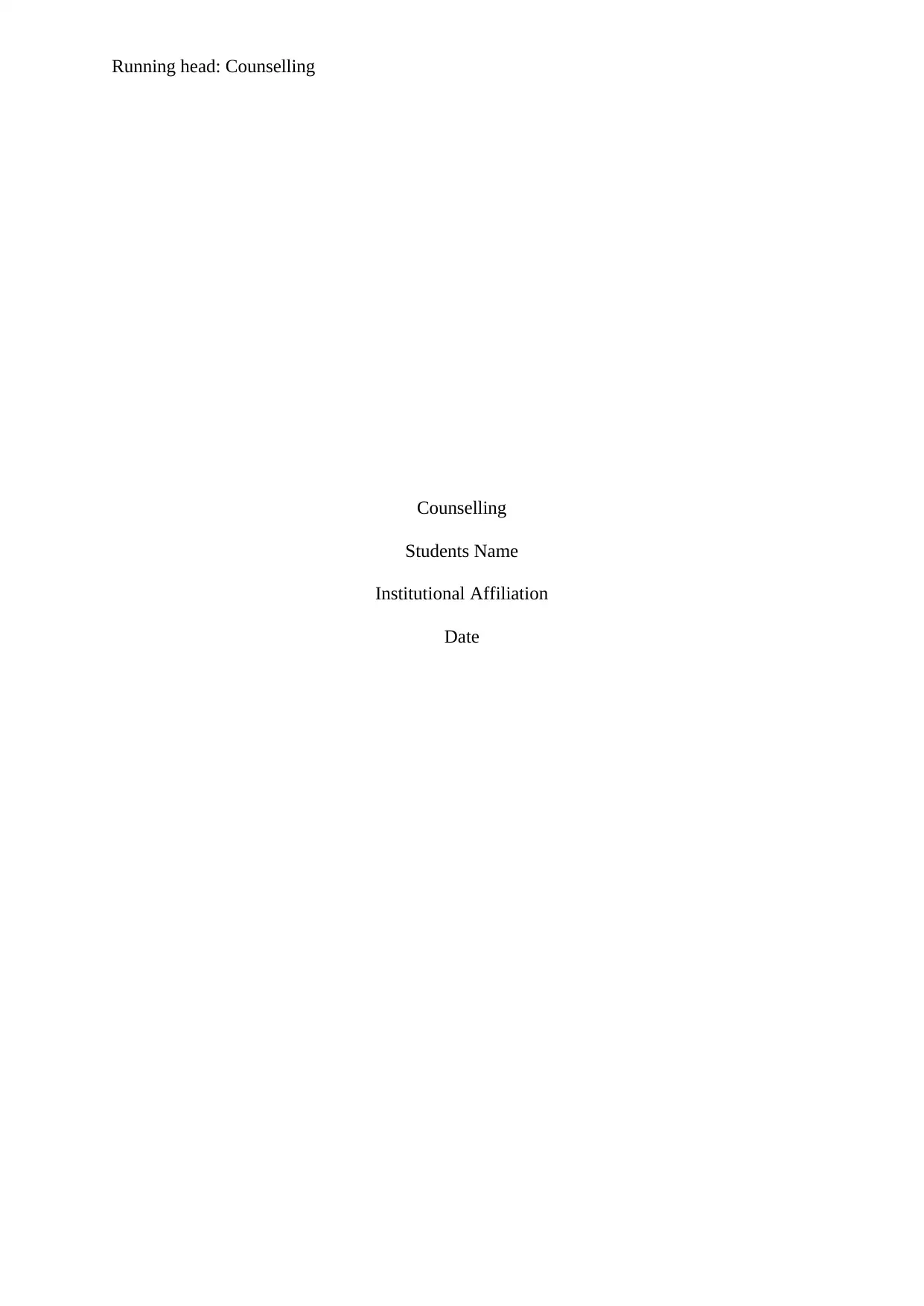
Running head: Counselling
Counselling
Students Name
Institutional Affiliation
Date
Counselling
Students Name
Institutional Affiliation
Date
Paraphrase This Document
Need a fresh take? Get an instant paraphrase of this document with our AI Paraphraser
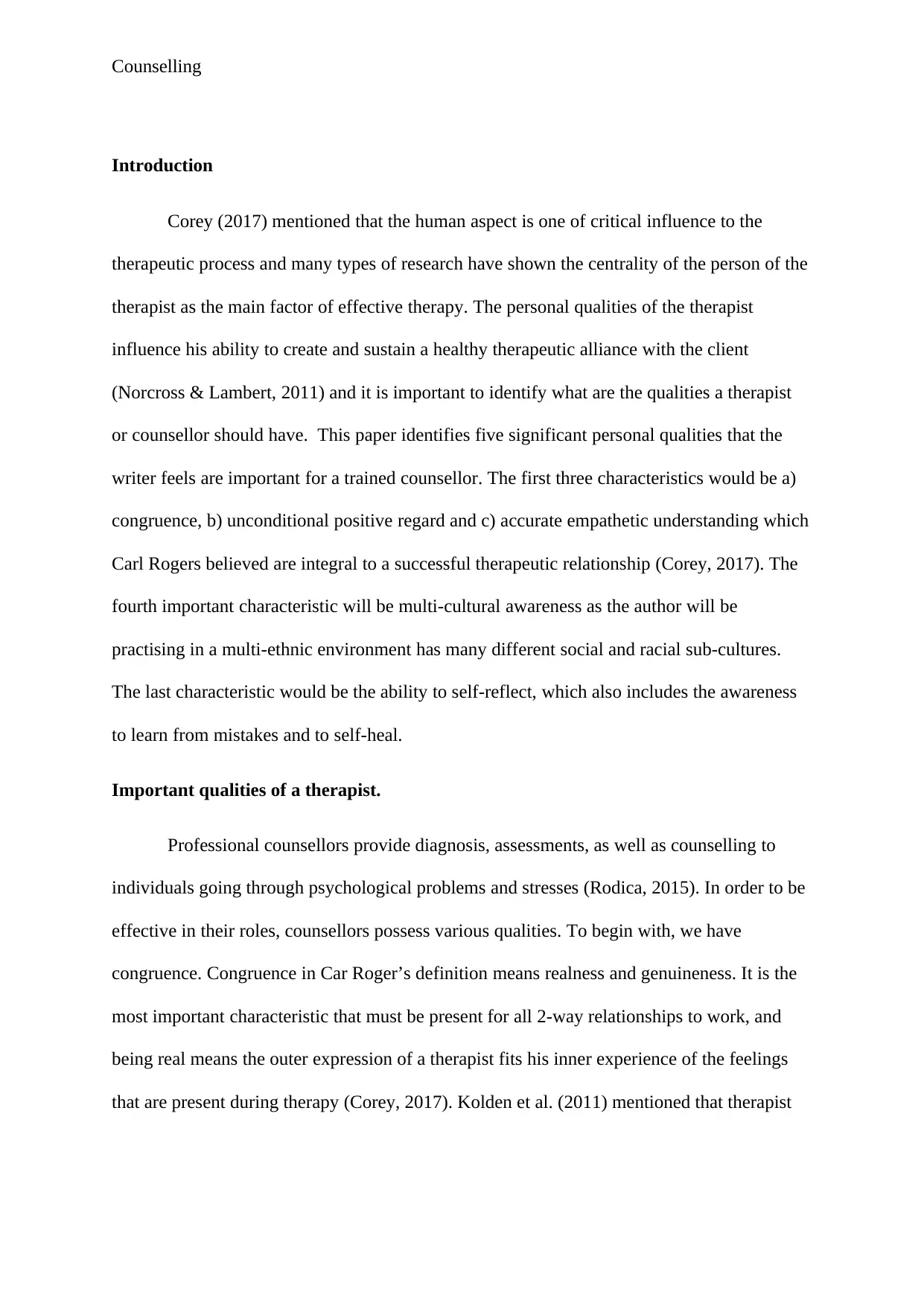
Counselling
Introduction
Corey (2017) mentioned that the human aspect is one of critical influence to the
therapeutic process and many types of research have shown the centrality of the person of the
therapist as the main factor of effective therapy. The personal qualities of the therapist
influence his ability to create and sustain a healthy therapeutic alliance with the client
(Norcross & Lambert, 2011) and it is important to identify what are the qualities a therapist
or counsellor should have. This paper identifies five significant personal qualities that the
writer feels are important for a trained counsellor. The first three characteristics would be a)
congruence, b) unconditional positive regard and c) accurate empathetic understanding which
Carl Rogers believed are integral to a successful therapeutic relationship (Corey, 2017). The
fourth important characteristic will be multi-cultural awareness as the author will be
practising in a multi-ethnic environment has many different social and racial sub-cultures.
The last characteristic would be the ability to self-reflect, which also includes the awareness
to learn from mistakes and to self-heal.
Important qualities of a therapist.
Professional counsellors provide diagnosis, assessments, as well as counselling to
individuals going through psychological problems and stresses (Rodica, 2015). In order to be
effective in their roles, counsellors possess various qualities. To begin with, we have
congruence. Congruence in Car Roger’s definition means realness and genuineness. It is the
most important characteristic that must be present for all 2-way relationships to work, and
being real means the outer expression of a therapist fits his inner experience of the feelings
that are present during therapy (Corey, 2017). Kolden et al. (2011) mentioned that therapist
Introduction
Corey (2017) mentioned that the human aspect is one of critical influence to the
therapeutic process and many types of research have shown the centrality of the person of the
therapist as the main factor of effective therapy. The personal qualities of the therapist
influence his ability to create and sustain a healthy therapeutic alliance with the client
(Norcross & Lambert, 2011) and it is important to identify what are the qualities a therapist
or counsellor should have. This paper identifies five significant personal qualities that the
writer feels are important for a trained counsellor. The first three characteristics would be a)
congruence, b) unconditional positive regard and c) accurate empathetic understanding which
Carl Rogers believed are integral to a successful therapeutic relationship (Corey, 2017). The
fourth important characteristic will be multi-cultural awareness as the author will be
practising in a multi-ethnic environment has many different social and racial sub-cultures.
The last characteristic would be the ability to self-reflect, which also includes the awareness
to learn from mistakes and to self-heal.
Important qualities of a therapist.
Professional counsellors provide diagnosis, assessments, as well as counselling to
individuals going through psychological problems and stresses (Rodica, 2015). In order to be
effective in their roles, counsellors possess various qualities. To begin with, we have
congruence. Congruence in Car Roger’s definition means realness and genuineness. It is the
most important characteristic that must be present for all 2-way relationships to work, and
being real means the outer expression of a therapist fits his inner experience of the feelings
that are present during therapy (Corey, 2017). Kolden et al. (2011) mentioned that therapist
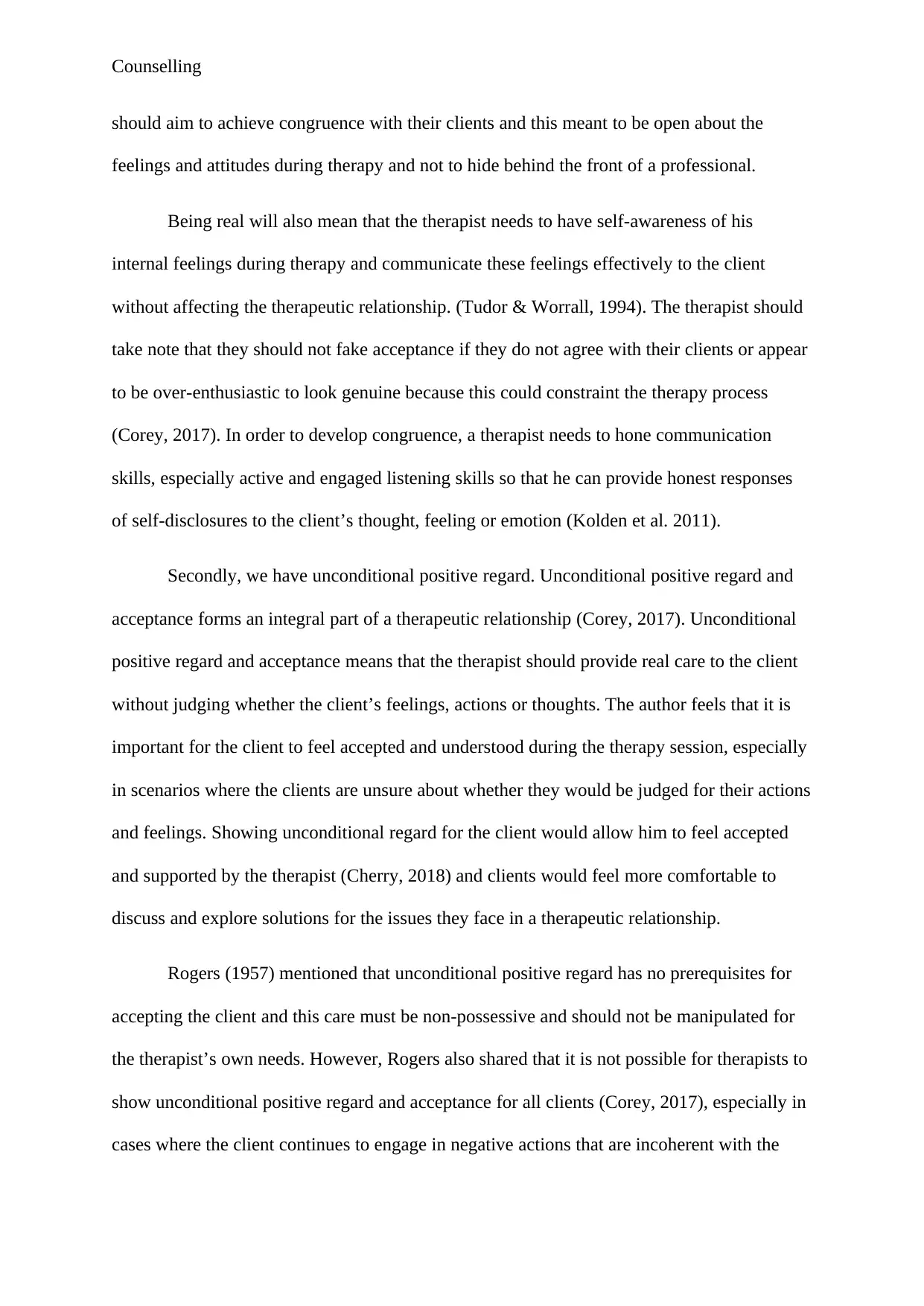
Counselling
should aim to achieve congruence with their clients and this meant to be open about the
feelings and attitudes during therapy and not to hide behind the front of a professional.
Being real will also mean that the therapist needs to have self-awareness of his
internal feelings during therapy and communicate these feelings effectively to the client
without affecting the therapeutic relationship. (Tudor & Worrall, 1994). The therapist should
take note that they should not fake acceptance if they do not agree with their clients or appear
to be over-enthusiastic to look genuine because this could constraint the therapy process
(Corey, 2017). In order to develop congruence, a therapist needs to hone communication
skills, especially active and engaged listening skills so that he can provide honest responses
of self-disclosures to the client’s thought, feeling or emotion (Kolden et al. 2011).
Secondly, we have unconditional positive regard. Unconditional positive regard and
acceptance forms an integral part of a therapeutic relationship (Corey, 2017). Unconditional
positive regard and acceptance means that the therapist should provide real care to the client
without judging whether the client’s feelings, actions or thoughts. The author feels that it is
important for the client to feel accepted and understood during the therapy session, especially
in scenarios where the clients are unsure about whether they would be judged for their actions
and feelings. Showing unconditional regard for the client would allow him to feel accepted
and supported by the therapist (Cherry, 2018) and clients would feel more comfortable to
discuss and explore solutions for the issues they face in a therapeutic relationship.
Rogers (1957) mentioned that unconditional positive regard has no prerequisites for
accepting the client and this care must be non-possessive and should not be manipulated for
the therapist’s own needs. However, Rogers also shared that it is not possible for therapists to
show unconditional positive regard and acceptance for all clients (Corey, 2017), especially in
cases where the client continues to engage in negative actions that are incoherent with the
should aim to achieve congruence with their clients and this meant to be open about the
feelings and attitudes during therapy and not to hide behind the front of a professional.
Being real will also mean that the therapist needs to have self-awareness of his
internal feelings during therapy and communicate these feelings effectively to the client
without affecting the therapeutic relationship. (Tudor & Worrall, 1994). The therapist should
take note that they should not fake acceptance if they do not agree with their clients or appear
to be over-enthusiastic to look genuine because this could constraint the therapy process
(Corey, 2017). In order to develop congruence, a therapist needs to hone communication
skills, especially active and engaged listening skills so that he can provide honest responses
of self-disclosures to the client’s thought, feeling or emotion (Kolden et al. 2011).
Secondly, we have unconditional positive regard. Unconditional positive regard and
acceptance forms an integral part of a therapeutic relationship (Corey, 2017). Unconditional
positive regard and acceptance means that the therapist should provide real care to the client
without judging whether the client’s feelings, actions or thoughts. The author feels that it is
important for the client to feel accepted and understood during the therapy session, especially
in scenarios where the clients are unsure about whether they would be judged for their actions
and feelings. Showing unconditional regard for the client would allow him to feel accepted
and supported by the therapist (Cherry, 2018) and clients would feel more comfortable to
discuss and explore solutions for the issues they face in a therapeutic relationship.
Rogers (1957) mentioned that unconditional positive regard has no prerequisites for
accepting the client and this care must be non-possessive and should not be manipulated for
the therapist’s own needs. However, Rogers also shared that it is not possible for therapists to
show unconditional positive regard and acceptance for all clients (Corey, 2017), especially in
cases where the client continues to engage in negative actions that are incoherent with the
⊘ This is a preview!⊘
Do you want full access?
Subscribe today to unlock all pages.

Trusted by 1+ million students worldwide
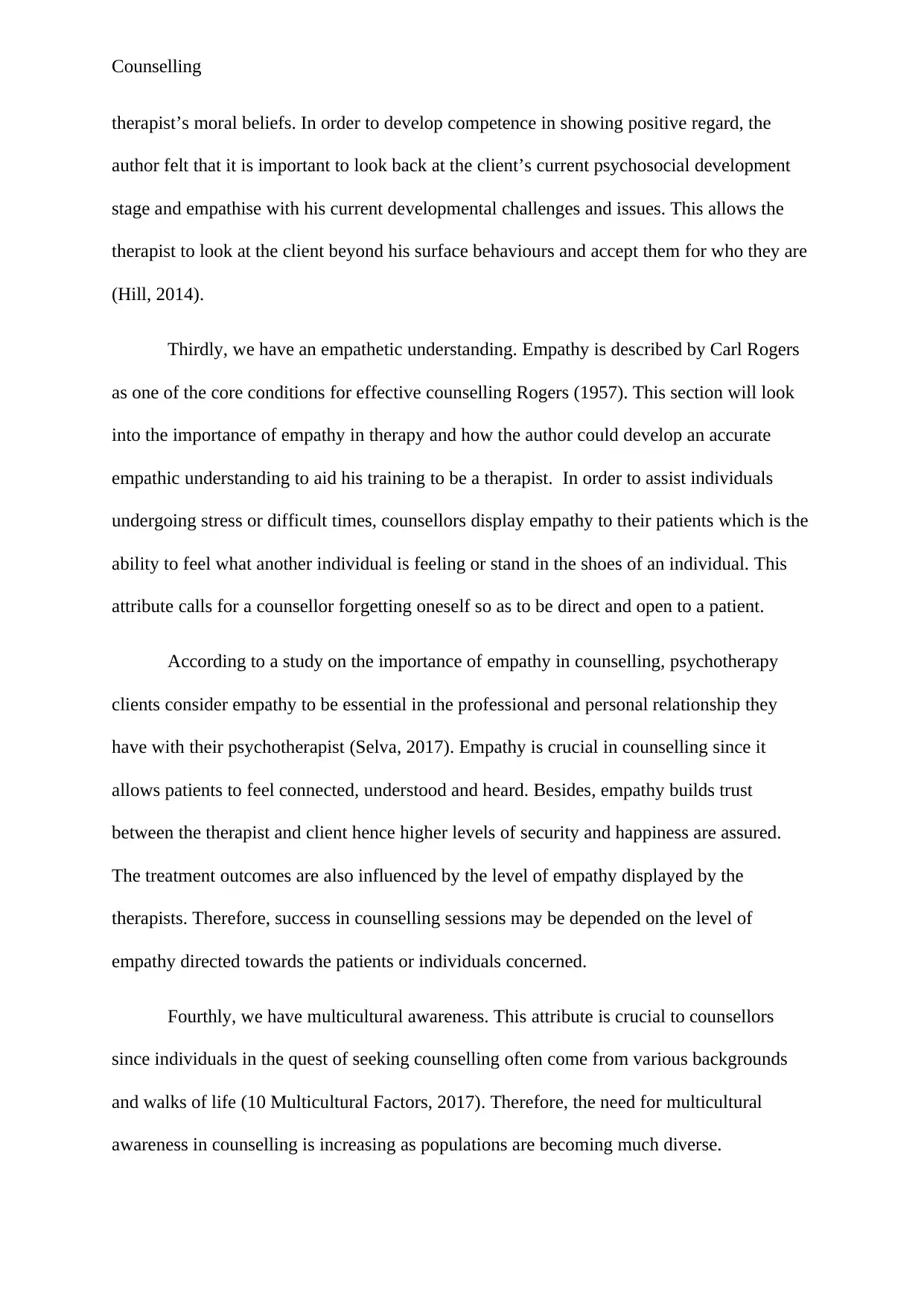
Counselling
therapist’s moral beliefs. In order to develop competence in showing positive regard, the
author felt that it is important to look back at the client’s current psychosocial development
stage and empathise with his current developmental challenges and issues. This allows the
therapist to look at the client beyond his surface behaviours and accept them for who they are
(Hill, 2014).
Thirdly, we have an empathetic understanding. Empathy is described by Carl Rogers
as one of the core conditions for effective counselling Rogers (1957). This section will look
into the importance of empathy in therapy and how the author could develop an accurate
empathic understanding to aid his training to be a therapist. In order to assist individuals
undergoing stress or difficult times, counsellors display empathy to their patients which is the
ability to feel what another individual is feeling or stand in the shoes of an individual. This
attribute calls for a counsellor forgetting oneself so as to be direct and open to a patient.
According to a study on the importance of empathy in counselling, psychotherapy
clients consider empathy to be essential in the professional and personal relationship they
have with their psychotherapist (Selva, 2017). Empathy is crucial in counselling since it
allows patients to feel connected, understood and heard. Besides, empathy builds trust
between the therapist and client hence higher levels of security and happiness are assured.
The treatment outcomes are also influenced by the level of empathy displayed by the
therapists. Therefore, success in counselling sessions may be depended on the level of
empathy directed towards the patients or individuals concerned.
Fourthly, we have multicultural awareness. This attribute is crucial to counsellors
since individuals in the quest of seeking counselling often come from various backgrounds
and walks of life (10 Multicultural Factors, 2017). Therefore, the need for multicultural
awareness in counselling is increasing as populations are becoming much diverse.
therapist’s moral beliefs. In order to develop competence in showing positive regard, the
author felt that it is important to look back at the client’s current psychosocial development
stage and empathise with his current developmental challenges and issues. This allows the
therapist to look at the client beyond his surface behaviours and accept them for who they are
(Hill, 2014).
Thirdly, we have an empathetic understanding. Empathy is described by Carl Rogers
as one of the core conditions for effective counselling Rogers (1957). This section will look
into the importance of empathy in therapy and how the author could develop an accurate
empathic understanding to aid his training to be a therapist. In order to assist individuals
undergoing stress or difficult times, counsellors display empathy to their patients which is the
ability to feel what another individual is feeling or stand in the shoes of an individual. This
attribute calls for a counsellor forgetting oneself so as to be direct and open to a patient.
According to a study on the importance of empathy in counselling, psychotherapy
clients consider empathy to be essential in the professional and personal relationship they
have with their psychotherapist (Selva, 2017). Empathy is crucial in counselling since it
allows patients to feel connected, understood and heard. Besides, empathy builds trust
between the therapist and client hence higher levels of security and happiness are assured.
The treatment outcomes are also influenced by the level of empathy displayed by the
therapists. Therefore, success in counselling sessions may be depended on the level of
empathy directed towards the patients or individuals concerned.
Fourthly, we have multicultural awareness. This attribute is crucial to counsellors
since individuals in the quest of seeking counselling often come from various backgrounds
and walks of life (10 Multicultural Factors, 2017). Therefore, the need for multicultural
awareness in counselling is increasing as populations are becoming much diverse.
Paraphrase This Document
Need a fresh take? Get an instant paraphrase of this document with our AI Paraphraser
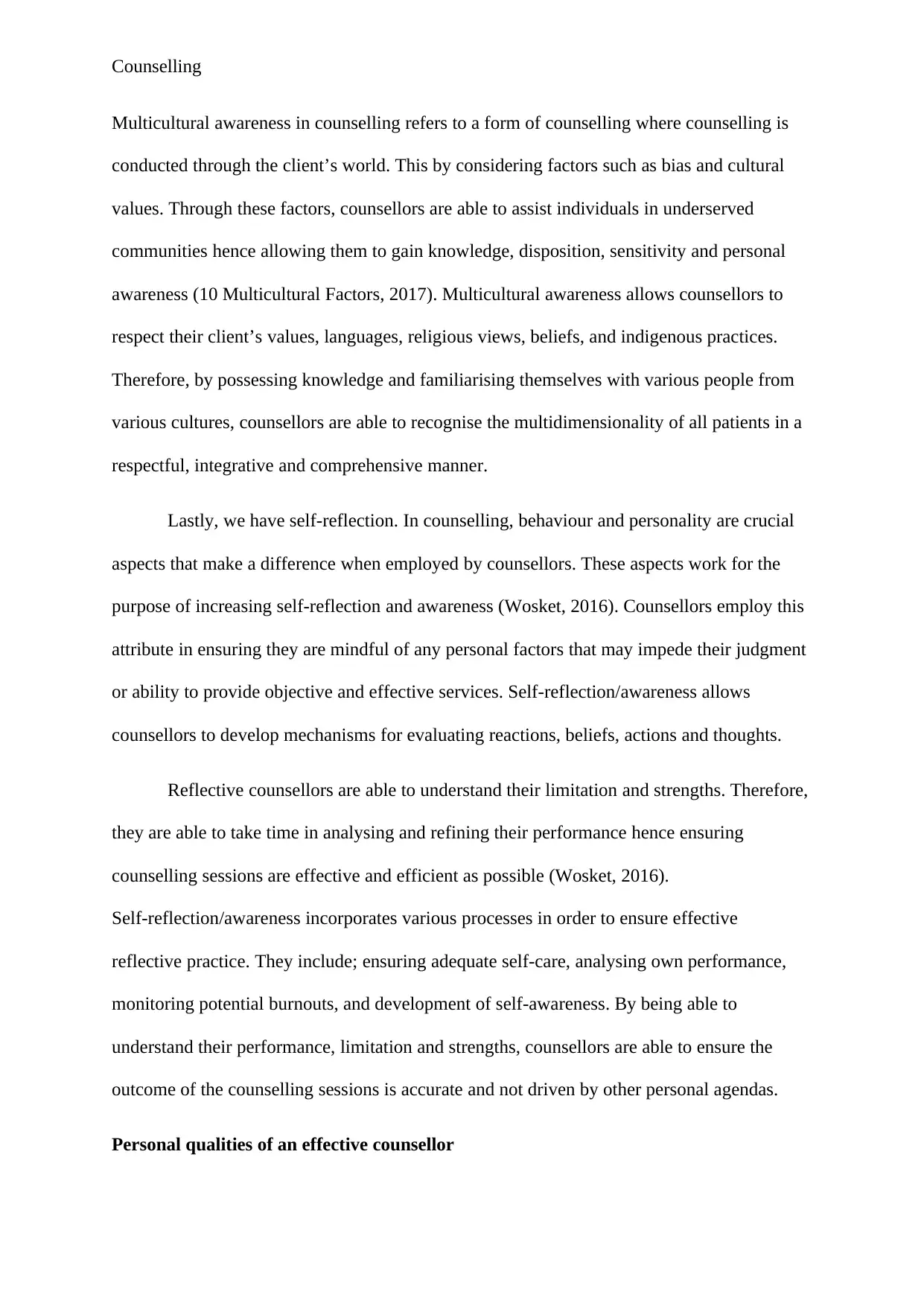
Counselling
Multicultural awareness in counselling refers to a form of counselling where counselling is
conducted through the client’s world. This by considering factors such as bias and cultural
values. Through these factors, counsellors are able to assist individuals in underserved
communities hence allowing them to gain knowledge, disposition, sensitivity and personal
awareness (10 Multicultural Factors, 2017). Multicultural awareness allows counsellors to
respect their client’s values, languages, religious views, beliefs, and indigenous practices.
Therefore, by possessing knowledge and familiarising themselves with various people from
various cultures, counsellors are able to recognise the multidimensionality of all patients in a
respectful, integrative and comprehensive manner.
Lastly, we have self-reflection. In counselling, behaviour and personality are crucial
aspects that make a difference when employed by counsellors. These aspects work for the
purpose of increasing self-reflection and awareness (Wosket, 2016). Counsellors employ this
attribute in ensuring they are mindful of any personal factors that may impede their judgment
or ability to provide objective and effective services. Self-reflection/awareness allows
counsellors to develop mechanisms for evaluating reactions, beliefs, actions and thoughts.
Reflective counsellors are able to understand their limitation and strengths. Therefore,
they are able to take time in analysing and refining their performance hence ensuring
counselling sessions are effective and efficient as possible (Wosket, 2016).
Self-reflection/awareness incorporates various processes in order to ensure effective
reflective practice. They include; ensuring adequate self-care, analysing own performance,
monitoring potential burnouts, and development of self-awareness. By being able to
understand their performance, limitation and strengths, counsellors are able to ensure the
outcome of the counselling sessions is accurate and not driven by other personal agendas.
Personal qualities of an effective counsellor
Multicultural awareness in counselling refers to a form of counselling where counselling is
conducted through the client’s world. This by considering factors such as bias and cultural
values. Through these factors, counsellors are able to assist individuals in underserved
communities hence allowing them to gain knowledge, disposition, sensitivity and personal
awareness (10 Multicultural Factors, 2017). Multicultural awareness allows counsellors to
respect their client’s values, languages, religious views, beliefs, and indigenous practices.
Therefore, by possessing knowledge and familiarising themselves with various people from
various cultures, counsellors are able to recognise the multidimensionality of all patients in a
respectful, integrative and comprehensive manner.
Lastly, we have self-reflection. In counselling, behaviour and personality are crucial
aspects that make a difference when employed by counsellors. These aspects work for the
purpose of increasing self-reflection and awareness (Wosket, 2016). Counsellors employ this
attribute in ensuring they are mindful of any personal factors that may impede their judgment
or ability to provide objective and effective services. Self-reflection/awareness allows
counsellors to develop mechanisms for evaluating reactions, beliefs, actions and thoughts.
Reflective counsellors are able to understand their limitation and strengths. Therefore,
they are able to take time in analysing and refining their performance hence ensuring
counselling sessions are effective and efficient as possible (Wosket, 2016).
Self-reflection/awareness incorporates various processes in order to ensure effective
reflective practice. They include; ensuring adequate self-care, analysing own performance,
monitoring potential burnouts, and development of self-awareness. By being able to
understand their performance, limitation and strengths, counsellors are able to ensure the
outcome of the counselling sessions is accurate and not driven by other personal agendas.
Personal qualities of an effective counsellor
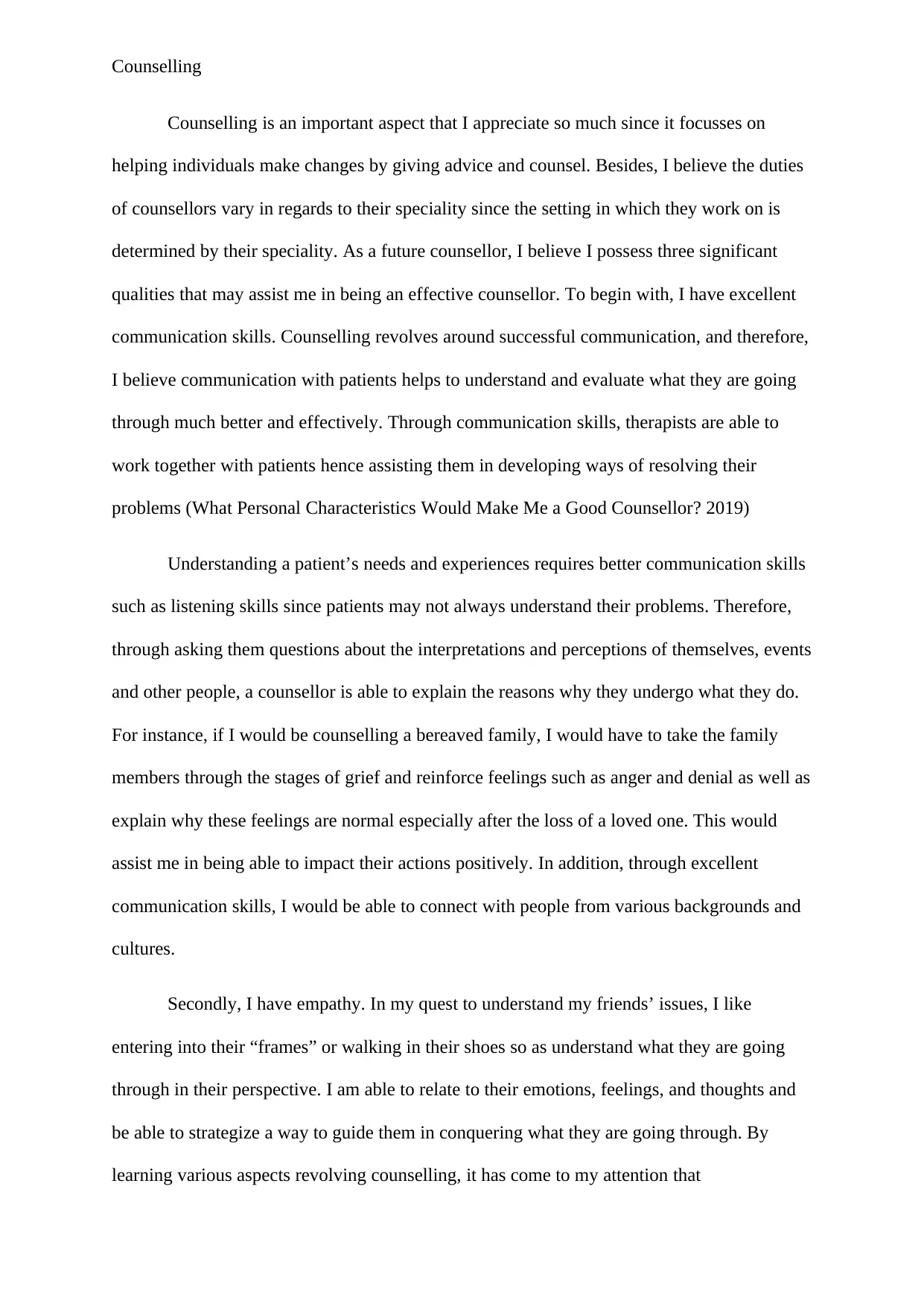
Counselling
Counselling is an important aspect that I appreciate so much since it focusses on
helping individuals make changes by giving advice and counsel. Besides, I believe the duties
of counsellors vary in regards to their speciality since the setting in which they work on is
determined by their speciality. As a future counsellor, I believe I possess three significant
qualities that may assist me in being an effective counsellor. To begin with, I have excellent
communication skills. Counselling revolves around successful communication, and therefore,
I believe communication with patients helps to understand and evaluate what they are going
through much better and effectively. Through communication skills, therapists are able to
work together with patients hence assisting them in developing ways of resolving their
problems (What Personal Characteristics Would Make Me a Good Counsellor? 2019)
Understanding a patient’s needs and experiences requires better communication skills
such as listening skills since patients may not always understand their problems. Therefore,
through asking them questions about the interpretations and perceptions of themselves, events
and other people, a counsellor is able to explain the reasons why they undergo what they do.
For instance, if I would be counselling a bereaved family, I would have to take the family
members through the stages of grief and reinforce feelings such as anger and denial as well as
explain why these feelings are normal especially after the loss of a loved one. This would
assist me in being able to impact their actions positively. In addition, through excellent
communication skills, I would be able to connect with people from various backgrounds and
cultures.
Secondly, I have empathy. In my quest to understand my friends’ issues, I like
entering into their “frames” or walking in their shoes so as understand what they are going
through in their perspective. I am able to relate to their emotions, feelings, and thoughts and
be able to strategize a way to guide them in conquering what they are going through. By
learning various aspects revolving counselling, it has come to my attention that
Counselling is an important aspect that I appreciate so much since it focusses on
helping individuals make changes by giving advice and counsel. Besides, I believe the duties
of counsellors vary in regards to their speciality since the setting in which they work on is
determined by their speciality. As a future counsellor, I believe I possess three significant
qualities that may assist me in being an effective counsellor. To begin with, I have excellent
communication skills. Counselling revolves around successful communication, and therefore,
I believe communication with patients helps to understand and evaluate what they are going
through much better and effectively. Through communication skills, therapists are able to
work together with patients hence assisting them in developing ways of resolving their
problems (What Personal Characteristics Would Make Me a Good Counsellor? 2019)
Understanding a patient’s needs and experiences requires better communication skills
such as listening skills since patients may not always understand their problems. Therefore,
through asking them questions about the interpretations and perceptions of themselves, events
and other people, a counsellor is able to explain the reasons why they undergo what they do.
For instance, if I would be counselling a bereaved family, I would have to take the family
members through the stages of grief and reinforce feelings such as anger and denial as well as
explain why these feelings are normal especially after the loss of a loved one. This would
assist me in being able to impact their actions positively. In addition, through excellent
communication skills, I would be able to connect with people from various backgrounds and
cultures.
Secondly, I have empathy. In my quest to understand my friends’ issues, I like
entering into their “frames” or walking in their shoes so as understand what they are going
through in their perspective. I am able to relate to their emotions, feelings, and thoughts and
be able to strategize a way to guide them in conquering what they are going through. By
learning various aspects revolving counselling, it has come to my attention that
⊘ This is a preview!⊘
Do you want full access?
Subscribe today to unlock all pages.

Trusted by 1+ million students worldwide
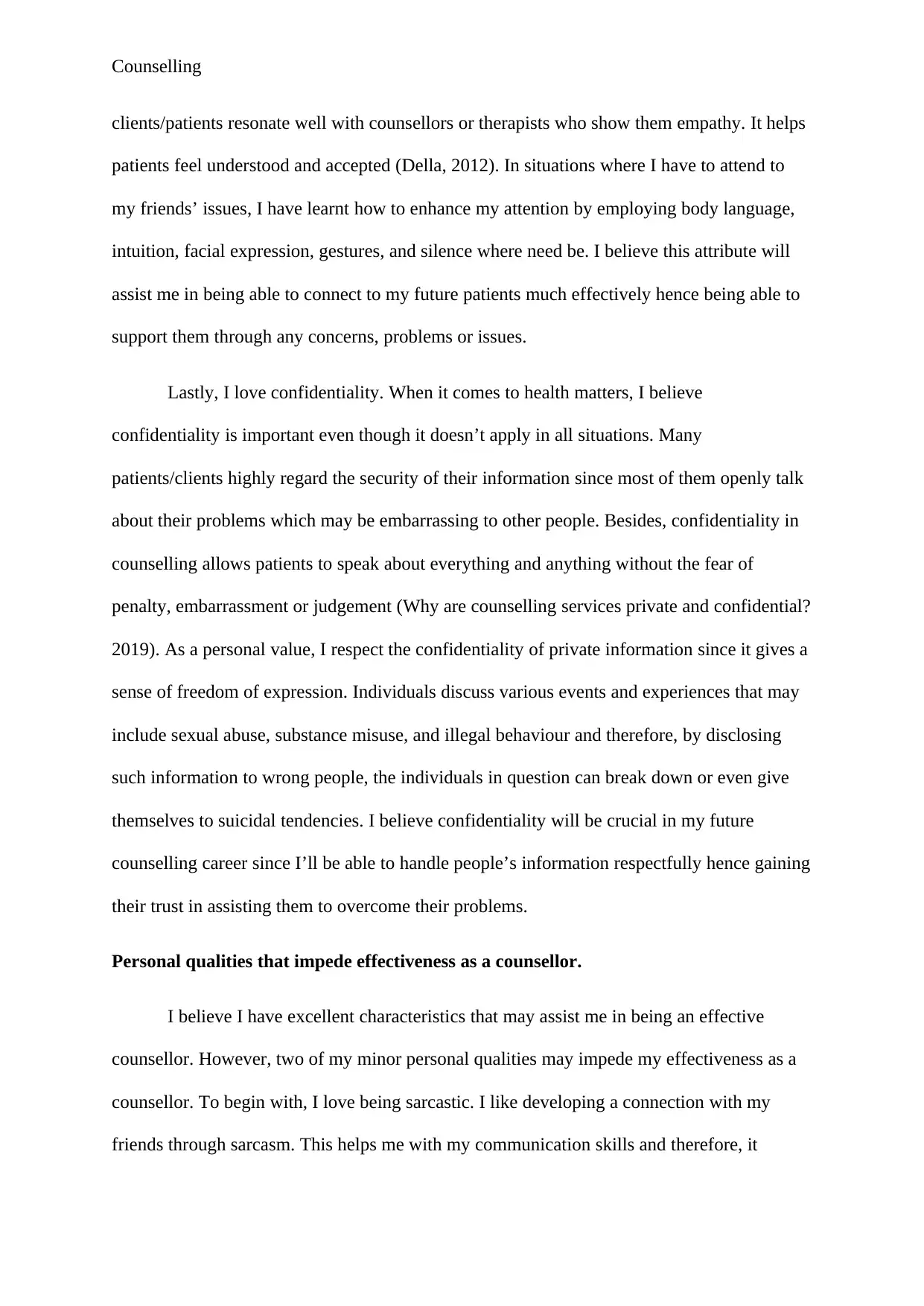
Counselling
clients/patients resonate well with counsellors or therapists who show them empathy. It helps
patients feel understood and accepted (Della, 2012). In situations where I have to attend to
my friends’ issues, I have learnt how to enhance my attention by employing body language,
intuition, facial expression, gestures, and silence where need be. I believe this attribute will
assist me in being able to connect to my future patients much effectively hence being able to
support them through any concerns, problems or issues.
Lastly, I love confidentiality. When it comes to health matters, I believe
confidentiality is important even though it doesn’t apply in all situations. Many
patients/clients highly regard the security of their information since most of them openly talk
about their problems which may be embarrassing to other people. Besides, confidentiality in
counselling allows patients to speak about everything and anything without the fear of
penalty, embarrassment or judgement (Why are counselling services private and confidential?
2019). As a personal value, I respect the confidentiality of private information since it gives a
sense of freedom of expression. Individuals discuss various events and experiences that may
include sexual abuse, substance misuse, and illegal behaviour and therefore, by disclosing
such information to wrong people, the individuals in question can break down or even give
themselves to suicidal tendencies. I believe confidentiality will be crucial in my future
counselling career since I’ll be able to handle people’s information respectfully hence gaining
their trust in assisting them to overcome their problems.
Personal qualities that impede effectiveness as a counsellor.
I believe I have excellent characteristics that may assist me in being an effective
counsellor. However, two of my minor personal qualities may impede my effectiveness as a
counsellor. To begin with, I love being sarcastic. I like developing a connection with my
friends through sarcasm. This helps me with my communication skills and therefore, it
clients/patients resonate well with counsellors or therapists who show them empathy. It helps
patients feel understood and accepted (Della, 2012). In situations where I have to attend to
my friends’ issues, I have learnt how to enhance my attention by employing body language,
intuition, facial expression, gestures, and silence where need be. I believe this attribute will
assist me in being able to connect to my future patients much effectively hence being able to
support them through any concerns, problems or issues.
Lastly, I love confidentiality. When it comes to health matters, I believe
confidentiality is important even though it doesn’t apply in all situations. Many
patients/clients highly regard the security of their information since most of them openly talk
about their problems which may be embarrassing to other people. Besides, confidentiality in
counselling allows patients to speak about everything and anything without the fear of
penalty, embarrassment or judgement (Why are counselling services private and confidential?
2019). As a personal value, I respect the confidentiality of private information since it gives a
sense of freedom of expression. Individuals discuss various events and experiences that may
include sexual abuse, substance misuse, and illegal behaviour and therefore, by disclosing
such information to wrong people, the individuals in question can break down or even give
themselves to suicidal tendencies. I believe confidentiality will be crucial in my future
counselling career since I’ll be able to handle people’s information respectfully hence gaining
their trust in assisting them to overcome their problems.
Personal qualities that impede effectiveness as a counsellor.
I believe I have excellent characteristics that may assist me in being an effective
counsellor. However, two of my minor personal qualities may impede my effectiveness as a
counsellor. To begin with, I love being sarcastic. I like developing a connection with my
friends through sarcasm. This helps me with my communication skills and therefore, it
Paraphrase This Document
Need a fresh take? Get an instant paraphrase of this document with our AI Paraphraser
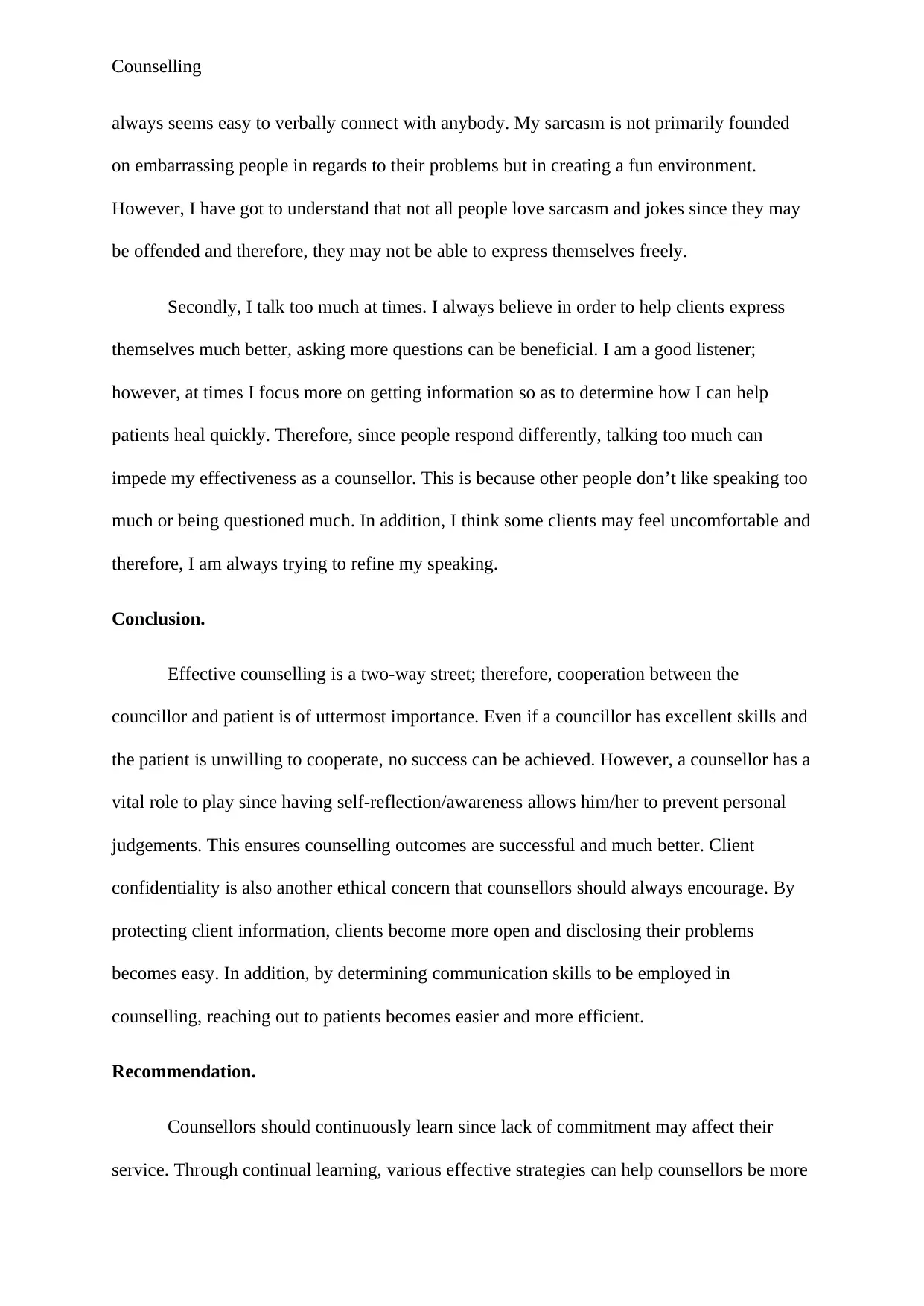
Counselling
always seems easy to verbally connect with anybody. My sarcasm is not primarily founded
on embarrassing people in regards to their problems but in creating a fun environment.
However, I have got to understand that not all people love sarcasm and jokes since they may
be offended and therefore, they may not be able to express themselves freely.
Secondly, I talk too much at times. I always believe in order to help clients express
themselves much better, asking more questions can be beneficial. I am a good listener;
however, at times I focus more on getting information so as to determine how I can help
patients heal quickly. Therefore, since people respond differently, talking too much can
impede my effectiveness as a counsellor. This is because other people don’t like speaking too
much or being questioned much. In addition, I think some clients may feel uncomfortable and
therefore, I am always trying to refine my speaking.
Conclusion.
Effective counselling is a two-way street; therefore, cooperation between the
councillor and patient is of uttermost importance. Even if a councillor has excellent skills and
the patient is unwilling to cooperate, no success can be achieved. However, a counsellor has a
vital role to play since having self-reflection/awareness allows him/her to prevent personal
judgements. This ensures counselling outcomes are successful and much better. Client
confidentiality is also another ethical concern that counsellors should always encourage. By
protecting client information, clients become more open and disclosing their problems
becomes easy. In addition, by determining communication skills to be employed in
counselling, reaching out to patients becomes easier and more efficient.
Recommendation.
Counsellors should continuously learn since lack of commitment may affect their
service. Through continual learning, various effective strategies can help counsellors be more
always seems easy to verbally connect with anybody. My sarcasm is not primarily founded
on embarrassing people in regards to their problems but in creating a fun environment.
However, I have got to understand that not all people love sarcasm and jokes since they may
be offended and therefore, they may not be able to express themselves freely.
Secondly, I talk too much at times. I always believe in order to help clients express
themselves much better, asking more questions can be beneficial. I am a good listener;
however, at times I focus more on getting information so as to determine how I can help
patients heal quickly. Therefore, since people respond differently, talking too much can
impede my effectiveness as a counsellor. This is because other people don’t like speaking too
much or being questioned much. In addition, I think some clients may feel uncomfortable and
therefore, I am always trying to refine my speaking.
Conclusion.
Effective counselling is a two-way street; therefore, cooperation between the
councillor and patient is of uttermost importance. Even if a councillor has excellent skills and
the patient is unwilling to cooperate, no success can be achieved. However, a counsellor has a
vital role to play since having self-reflection/awareness allows him/her to prevent personal
judgements. This ensures counselling outcomes are successful and much better. Client
confidentiality is also another ethical concern that counsellors should always encourage. By
protecting client information, clients become more open and disclosing their problems
becomes easy. In addition, by determining communication skills to be employed in
counselling, reaching out to patients becomes easier and more efficient.
Recommendation.
Counsellors should continuously learn since lack of commitment may affect their
service. Through continual learning, various effective strategies can help counsellors be more
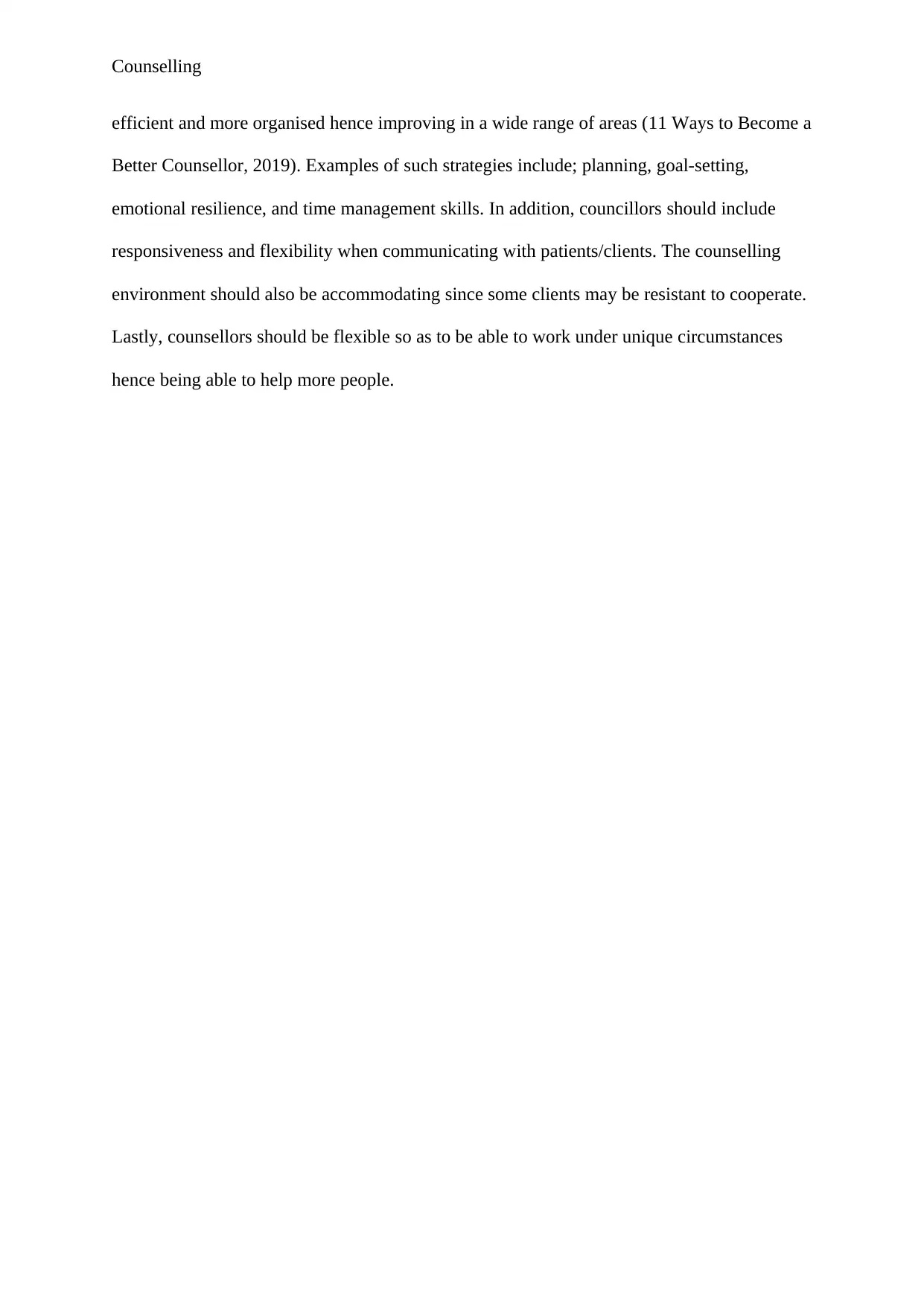
Counselling
efficient and more organised hence improving in a wide range of areas (11 Ways to Become a
Better Counsellor, 2019). Examples of such strategies include; planning, goal-setting,
emotional resilience, and time management skills. In addition, councillors should include
responsiveness and flexibility when communicating with patients/clients. The counselling
environment should also be accommodating since some clients may be resistant to cooperate.
Lastly, counsellors should be flexible so as to be able to work under unique circumstances
hence being able to help more people.
efficient and more organised hence improving in a wide range of areas (11 Ways to Become a
Better Counsellor, 2019). Examples of such strategies include; planning, goal-setting,
emotional resilience, and time management skills. In addition, councillors should include
responsiveness and flexibility when communicating with patients/clients. The counselling
environment should also be accommodating since some clients may be resistant to cooperate.
Lastly, counsellors should be flexible so as to be able to work under unique circumstances
hence being able to help more people.
⊘ This is a preview!⊘
Do you want full access?
Subscribe today to unlock all pages.

Trusted by 1+ million students worldwide
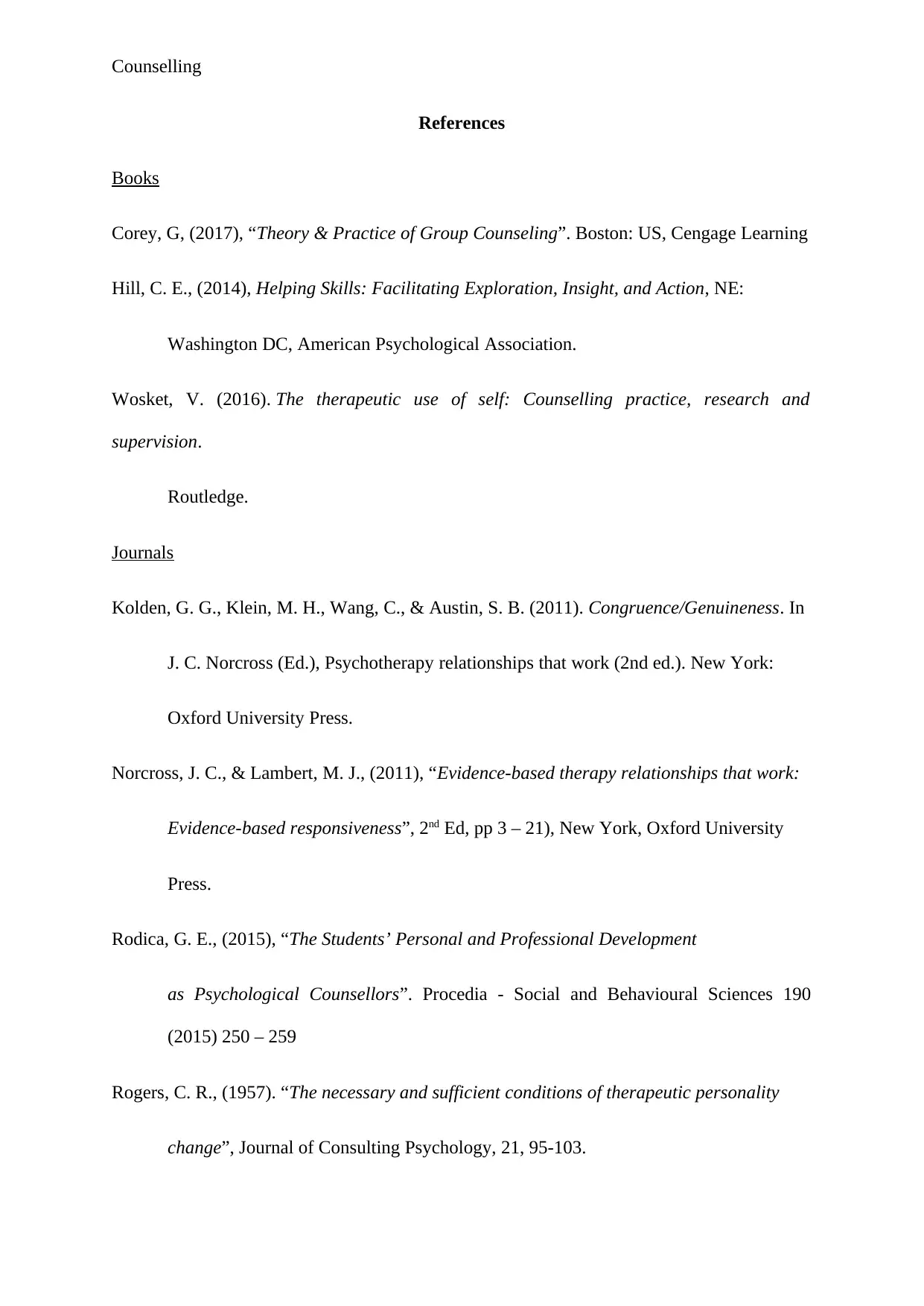
Counselling
References
Books
Corey, G, (2017), “Theory & Practice of Group Counseling”. Boston: US, Cengage Learning
Hill, C. E., (2014), Helping Skills: Facilitating Exploration, Insight, and Action, NE:
Washington DC, American Psychological Association.
Wosket, V. (2016). The therapeutic use of self: Counselling practice, research and
supervision.
Routledge.
Journals
Kolden, G. G., Klein, M. H., Wang, C., & Austin, S. B. (2011). Congruence/Genuineness. In
J. C. Norcross (Ed.), Psychotherapy relationships that work (2nd ed.). New York:
Oxford University Press.
Norcross, J. C., & Lambert, M. J., (2011), “Evidence-based therapy relationships that work:
Evidence-based responsiveness”, 2nd Ed, pp 3 – 21), New York, Oxford University
Press.
Rodica, G. E., (2015), “The Students’ Personal and Professional Development
as Psychological Counsellors”. Procedia - Social and Behavioural Sciences 190
(2015) 250 – 259
Rogers, C. R., (1957). “The necessary and sufficient conditions of therapeutic personality
change”, Journal of Consulting Psychology, 21, 95-103.
References
Books
Corey, G, (2017), “Theory & Practice of Group Counseling”. Boston: US, Cengage Learning
Hill, C. E., (2014), Helping Skills: Facilitating Exploration, Insight, and Action, NE:
Washington DC, American Psychological Association.
Wosket, V. (2016). The therapeutic use of self: Counselling practice, research and
supervision.
Routledge.
Journals
Kolden, G. G., Klein, M. H., Wang, C., & Austin, S. B. (2011). Congruence/Genuineness. In
J. C. Norcross (Ed.), Psychotherapy relationships that work (2nd ed.). New York:
Oxford University Press.
Norcross, J. C., & Lambert, M. J., (2011), “Evidence-based therapy relationships that work:
Evidence-based responsiveness”, 2nd Ed, pp 3 – 21), New York, Oxford University
Press.
Rodica, G. E., (2015), “The Students’ Personal and Professional Development
as Psychological Counsellors”. Procedia - Social and Behavioural Sciences 190
(2015) 250 – 259
Rogers, C. R., (1957). “The necessary and sufficient conditions of therapeutic personality
change”, Journal of Consulting Psychology, 21, 95-103.
Paraphrase This Document
Need a fresh take? Get an instant paraphrase of this document with our AI Paraphraser
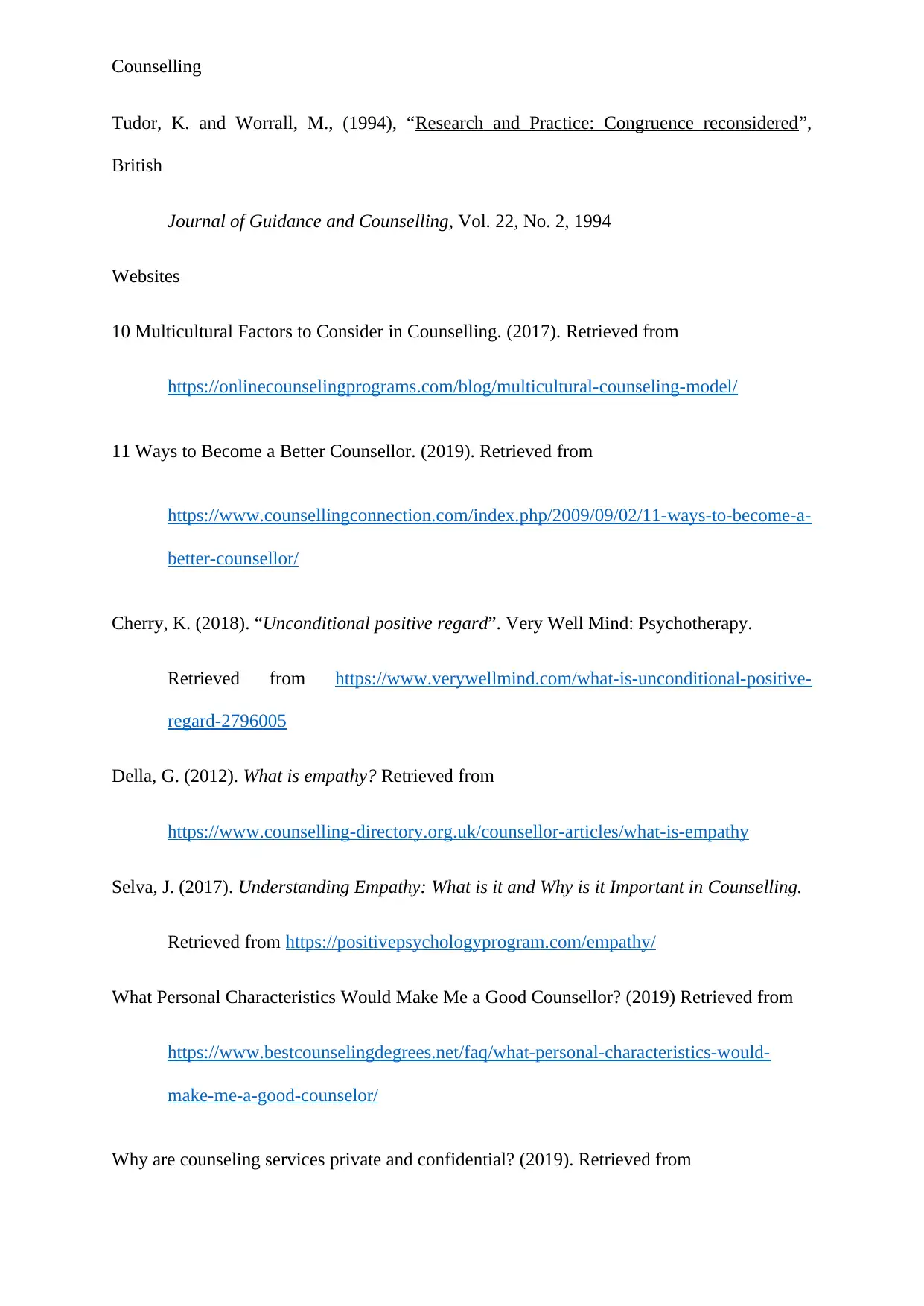
Counselling
Tudor, K. and Worrall, M., (1994), “Research and Practice: Congruence reconsidered”,
British
Journal of Guidance and Counselling, Vol. 22, No. 2, 1994
Websites
10 Multicultural Factors to Consider in Counselling. (2017). Retrieved from
https://onlinecounselingprograms.com/blog/multicultural-counseling-model/
11 Ways to Become a Better Counsellor. (2019). Retrieved from
https://www.counsellingconnection.com/index.php/2009/09/02/11-ways-to-become-a-
better-counsellor/
Cherry, K. (2018). “Unconditional positive regard”. Very Well Mind: Psychotherapy.
Retrieved from https://www.verywellmind.com/what-is-unconditional-positive-
regard-2796005
Della, G. (2012). What is empathy? Retrieved from
https://www.counselling-directory.org.uk/counsellor-articles/what-is-empathy
Selva, J. (2017). Understanding Empathy: What is it and Why is it Important in Counselling.
Retrieved from https://positivepsychologyprogram.com/empathy/
What Personal Characteristics Would Make Me a Good Counsellor? (2019) Retrieved from
https://www.bestcounselingdegrees.net/faq/what-personal-characteristics-would-
make-me-a-good-counselor/
Why are counseling services private and confidential? (2019). Retrieved from
Tudor, K. and Worrall, M., (1994), “Research and Practice: Congruence reconsidered”,
British
Journal of Guidance and Counselling, Vol. 22, No. 2, 1994
Websites
10 Multicultural Factors to Consider in Counselling. (2017). Retrieved from
https://onlinecounselingprograms.com/blog/multicultural-counseling-model/
11 Ways to Become a Better Counsellor. (2019). Retrieved from
https://www.counsellingconnection.com/index.php/2009/09/02/11-ways-to-become-a-
better-counsellor/
Cherry, K. (2018). “Unconditional positive regard”. Very Well Mind: Psychotherapy.
Retrieved from https://www.verywellmind.com/what-is-unconditional-positive-
regard-2796005
Della, G. (2012). What is empathy? Retrieved from
https://www.counselling-directory.org.uk/counsellor-articles/what-is-empathy
Selva, J. (2017). Understanding Empathy: What is it and Why is it Important in Counselling.
Retrieved from https://positivepsychologyprogram.com/empathy/
What Personal Characteristics Would Make Me a Good Counsellor? (2019) Retrieved from
https://www.bestcounselingdegrees.net/faq/what-personal-characteristics-would-
make-me-a-good-counselor/
Why are counseling services private and confidential? (2019). Retrieved from

Counselling
https://hilo.hawaii.edu/studentaffairs/counseling/confidentiality.php
https://hilo.hawaii.edu/studentaffairs/counseling/confidentiality.php
⊘ This is a preview!⊘
Do you want full access?
Subscribe today to unlock all pages.

Trusted by 1+ million students worldwide
1 out of 12
Related Documents
Your All-in-One AI-Powered Toolkit for Academic Success.
+13062052269
info@desklib.com
Available 24*7 on WhatsApp / Email
![[object Object]](/_next/static/media/star-bottom.7253800d.svg)
Unlock your academic potential
Copyright © 2020–2026 A2Z Services. All Rights Reserved. Developed and managed by ZUCOL.





